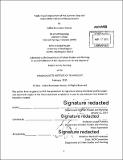Public health implications of hot summer days and vulnerability indexes in Massachusetts
Author(s)
Reeves, Halley Brunsteter
DownloadFull printable version (15.54Mb)
Other Contributors
Massachusetts Institute of Technology. Department of Urban Studies and Planning.
Advisor
Joseph Ferreira.
Terms of use
Metadata
Show full item recordAbstract
Due to ever-increasing summer temperatures and a population with minimal technological adaptations to help them cope, extreme heat events will likely have a large impact on vulnerable populations in Massachusetts. As such, heat events are likely to impact the health of residents because they are related to a rise in all-cause hospital admissions and other health outcomes. We sought to clarify how Massachusetts may improve their extreme heat event response policies. To do so, we examined Massachusetts' current policies and best practices for extreme heat event response as well as the spatiotemporal weather and vulnerability patterns throughout the state. As a result, we found that varying the scale of response will be necessary based on the extent of different heat events. Additionally, the state ought to clarify who is in charge at the state and regional levels. By better addressing the needs of its populations during heat events, Massachusetts would likely prevent unnecessary hospital admissions and harm to its residents.
Description
Thesis: M.C.P., Massachusetts Institute of Technology, Department of Urban Studies and Planning, 2015. Cataloged from PDF version of thesis. Includes bibliographical references (pages 37-41).
Date issued
2015Department
Massachusetts Institute of Technology. Department of Urban Studies and PlanningPublisher
Massachusetts Institute of Technology
Keywords
Urban Studies and Planning.